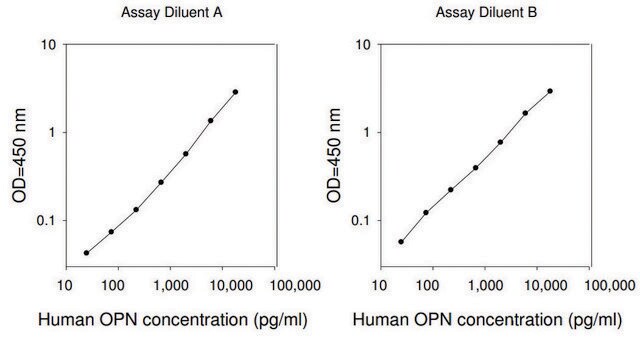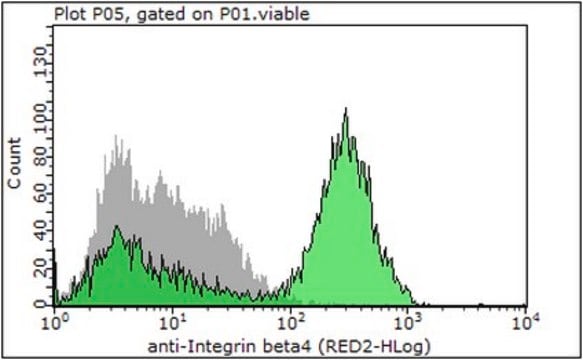05-449-C
Anti-Bin1, clone 99D (Ascites Free) Antibody
clone 99D, 1 mg/mL, from mouse
Synonyme(s) :
Myc box-dependent-interacting protein 1, Amphiphysin II, Amphiphysin-like protein, Box-dependent myc-interacting protein 1, Bridging integrator 1, Bin1
About This Item
Produits recommandés
Source biologique
mouse
Niveau de qualité
Forme d'anticorps
purified antibody
Type de produit anticorps
primary antibodies
Clone
99D, monoclonal
Espèces réactives
mouse, chicken, human
Concentration
1 mg/mL
Technique(s)
flow cytometry: suitable
immunofluorescence: suitable
immunohistochemistry: suitable
immunoprecipitation (IP): suitable
western blot: suitable
Isotype
IgG2bκ
Numéro d'accès NCBI
Numéro d'accès UniProt
Conditions d'expédition
wet ice
Modification post-traductionnelle de la cible
unmodified
Informations sur le gène
chicken ... Bin1(424228)
human ... BIN1(274)
mouse ... Bin1(30948)
Description générale
Immunogène
Application
Western Blotting Analysis: A representative lot detected Bin1 in primary chicken embryo fibroblasts (Telfer, J.F., et al. (2005). Cellular Signalling. 17:701-8).
Immunoprecipitation Analysis: A representative lot immunoprecipitated Bin1 in C2C12 cell lysate (Wechsler-Reya, R., et al. (1997). Cancer Res. 57:3258-63).
Western Blotting Analysis: A representative lot detected Bin1 in human and rodent cell lines (Wechsler-Reya, R., et al. (1997). Cancer Res. 57:3258-63).
Immunoprecipitation Analysis: A representative lot immunoprecipitated Bin1 in co-immunoprecipitation studies (Sakamuro, D., et al. (1996). Nat. Genet. 14:69-77).
Immunohistochemistry Analysis: A representative lot detected Bin1 in breast and liver carcinoma tissues (Sakamuro, D., et al. (1996). Nat. Genet. 14:69-77).
Immunoprecipitation Analysis: A representative lot immunoprecipitated Bin1 in C2C12 cell lysate (Wechsler-Reya, R. J., et al. (1998). Mol Cell Biol. 18:566-75).
Western Blotting Analysis: A representative lot detected Bin1 in C2C12 cell lysate (Wechsler-Reya, R. J., et al. (1998). Mol Cell Biol. 18:566-75).
Flow Cytometry Analysis: A representative lot detected Bin1 in C2C12 cell lysate (Wechsler-Reya, R. J., et al. (1998). Mol Cell Biol. 18:566-75).
Immunofluorescence Analysis: A representative lot detected Bin1 in C2C12 cells (Wechsler-Reya, R. J., et al. (1998). Mol Cell Biol. 18:566-75).
Apoptosis & Cancer
Apoptosis - Additional
Qualité
Western Blotting Analysis: 1.0 µg/mL of this antibody detected Bin1 in 10 µg of human skeletal muscle tissue lysate.
Description de la cible
Forme physique
Stockage et stabilité
Clause de non-responsabilité
Vous ne trouvez pas le bon produit ?
Essayez notre Outil de sélection de produits.
En option
Code de la classe de stockage
12 - Non Combustible Liquids
Classe de danger pour l'eau (WGK)
WGK 1
Point d'éclair (°F)
Not applicable
Point d'éclair (°C)
Not applicable
Certificats d'analyse (COA)
Recherchez un Certificats d'analyse (COA) en saisissant le numéro de lot du produit. Les numéros de lot figurent sur l'étiquette du produit après les mots "Lot" ou "Batch".
Déjà en possession de ce produit ?
Retrouvez la documentation relative aux produits que vous avez récemment achetés dans la Bibliothèque de documents.
Notre équipe de scientifiques dispose d'une expérience dans tous les secteurs de la recherche, notamment en sciences de la vie, science des matériaux, synthèse chimique, chromatographie, analyse et dans de nombreux autres domaines..
Contacter notre Service technique








